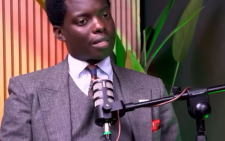Nyamira widow: Why I refused to throw soil into my husband’s grave

The humiliating ordeal of a young woman at the burial of her husband in Nyamira county continues to draw condemnation countrywide from political and religious quarters.
On March 21, a viral video of Mellen Mogaka, emerged showing her being assaulted and humiliated during her husband Wilfred Osoro’s burial, in Nyabisimba village, Nyamira county.
Her crime? Refusing to throw soil inside her husband’s grave. In a one-on-one interview in Narok where she now lives, Mogaka told PD Weekendi that she had separated from her husband and had only attended the burial as a mark of respect.
On the fateful day, Mogaka says she was attacked by three men, who stripped her, poured sand on her, and buried her shoes in the grave because of her refusal to perform the cultural act of throwing soil in her husband’s grave.
Father also assaulted
“My father, Nehemiah Matundura, also suffered violence during the incident. He was thrown into the grave and his suit got soiled,” she says.
And the gender based violence (GBV) meted against her did not end there.
Before her husband’s burial, Mogaka discloses that some Gusii elders locked her in a room with his body for a while, an ordeal that traumatised her.
Though the elders were forcing her to perform the cultural practice of throwing soil at her husband’s burial, she refused to do it because the two were separated.
On top of that, her husband had gone ahead and remarried another woman after she left.
According to Mogaka, her mother-in-law knew all this yet allowed her to be assaulted and humiliated.
But why is the throwing of soil so important in Kisii culture and what are the implications of throwing or refusing to throw the soil in the grave?
According to Hellen Ongwae, a Seventh Day Adventist faithful, in Kisii culture, a widow’s act of throwing sand during her husband’s burial carries deep significance.
If she throws the sand, it symbolises her commitment to remaining in that household forever, signifying that she will never remarry.
However, if she refuses to do so, it indicates her intention to move on, possibly entering another relationship or remarrying in the future.
“Faith and personal choice should take precedence over cultural expectations,” she says.
But for Ms Mogaka, this should not have happened because she had separated from her husband last year and moved on. Culture aside, the prevalence of gender based violence (GBV) against women and girls continues despite efforts to stop it.
Alarmingly, GBV incidences in Kenya remain high with data showing that 35 per cent of women and girls are affected.
As the assault video continues to be shared online, leaders have come out strongly to condemn the act rooted in some retrogressive cultures.
Nyamira County Women Representative Jerusha Momanyi condemned the horrific act saying it is unacceptable.
“Every person, deserves to live free from fear and violence, regardless of their gender, cultural background, or any other characteristic,” she stated.
She urged the community to stand together to challenge and dismantle such structures that allow violence to persist.
“Cultural beliefs should never be used as an excuse to justify the mistreatment or harm of others,” she said.
She stressed that it is important for communities to promote equality, respect, and human rights.
“Let us reaffirm our commitment to ending gender-based violence, supporting survivors, and creating a county where everyone can live with dignity, security, and respect.”
Condemning the attack, George Nyakundi, an elder and Chairman of the Mwanyagetinge Heritage Council, dismissed claims that it is part of Kisii culture.
Nyakundi explained that the act of throwing soil is not necessarily a customary practice when someone dies.
From dust to dust
“Throwing soil into the grave was not a traditional practice in the past. It was introduced by a white man who founded a church, bringing this custom, which has since been preserved,” he said.
He called for support for grieving families instead of being shown acts of violence.
“Death is something tragic that leaves family, friends, and the community in pain and distress,” he noted adding that this time should be used to allow the deceased to be buried with respect and dignity and the family to grieve peacefully.
Reports have been flying around that what happened to the woman is rooted in Kisii culture. On his part, pastor Joshua Abunda said the act of throwing soil into a grave is a symbolic signifying the deceased’s return to the earth.
He explained that the act echoes the biblical sentiment that humans are formed from dust and to dust they shall return.
The phrase “from dust to dust” is found in Genesis 3:19 where God tells Adam, “For dust you are, and to dust you shall return.”
“So, the act of throwing soil into a grave symbolises the deceased’s return to the natural world from which they came. This practice is often linked to the phrase, ‘Dust you are, and to dust you shall return,’ from the Book of Genesis, Chapter 3, Verse 19,” said the pastor.
According to him, when somebody dies mourners are expected to participate in the final act of farewell and acknowledge the end of the deceased’s earthly journey.
“The ritual of throwing soil into the grave serves as a profound expression of respect, acceptance, and connection to the natural cycle, offering solace and closure to those grieving,” he said.
He said this practice of throwing soil into the grave cuts across various cultures and religious contexts, serving as a way to honour the deceased and acknowledge the cycle of life and death.












